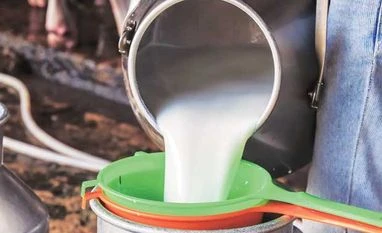The government will this month sign the protocol for shipping milk derivatives almost a year after Russia opened its market to Indian dairy products. The first consignment is expected to ship in January.
"Representatives of the Processed Food Products Export Development Authority (Apeda) have informed us that the protocol on conditions for dairy product export from India to Russia was being studied by the Indian government and would be signed before the end of the current month," a statement by Rosselkhoznadzor, the Russian phytosanitary authority, said.
Russian President Vladimir Putin announced the opening up of his country's market to Indian dairy products during his visit to India in December 2014. The commerce ministry has found it difficult to sign the protocol because of a requirement of least 1,000 milking animals to be owned by farms interested in exporting dairy products to Russia.
Indian dairy farms are run primarily by co-operatives where the cattle is owned by individual farmers. Only two farms conform to the Russian norms, Schreiber Dynamix and Parag Milk Foods. The government wants the export opportunity should be available to major co-operatives like the Gujarat Co-operative Milk Marketing Federation, which produces India's top dairy brand Amul.
Rosselkhoznadzor clarified the protocol would allow the two large Indian dairy farms to be included in its list of exporting establishments. India has been negotiating for "a cluster of 1,000 milking animals" so that the major dairy co-operatives also conform to the Russian requirements. "We are negotiating with the Russians for liberalising norms to accommodate more players. A cluster norm will aid greater penetration of the Russian market by Indian players," said an official with the Export Inspection Council involved in the negotiations.
Indian dairy players are eying a major share of Russia's $690 million 230,000 tonne cheese market.
"We suggested to the government that the Russian norm was impractical as India does not have many dairies with 1,000 animals. So signing protocol would yield no result," said RS Sodhi, chairman of the Gujarat Co-operative Milk Marketing Federation.
"We are waiting for an assurance certificate from the Indian establishment, a requirement of the Russian authorities. We are an approved identity from the Russian side, but this assurance needs to be cleared and sent to them for exports to begin," said Devendra Shah, chairman, Parag Milk Foods, producer of the Govardhan brand milk and its derivatives.
"We have distribution and product sales arrangements with various Russian buyers interested in importing our products," Shah added. With two facilities for handling 2 million litres of milk a day, Parag Milk Foods exports dairy products to the Middle East, the Philippines and Singapore.
"Representatives of the Processed Food Products Export Development Authority (Apeda) have informed us that the protocol on conditions for dairy product export from India to Russia was being studied by the Indian government and would be signed before the end of the current month," a statement by Rosselkhoznadzor, the Russian phytosanitary authority, said.
| FREE FLOW |
|
Russian President Vladimir Putin announced the opening up of his country's market to Indian dairy products during his visit to India in December 2014. The commerce ministry has found it difficult to sign the protocol because of a requirement of least 1,000 milking animals to be owned by farms interested in exporting dairy products to Russia.
More From This Section
Indian dairy farms are run primarily by co-operatives where the cattle is owned by individual farmers. Only two farms conform to the Russian norms, Schreiber Dynamix and Parag Milk Foods. The government wants the export opportunity should be available to major co-operatives like the Gujarat Co-operative Milk Marketing Federation, which produces India's top dairy brand Amul.
Rosselkhoznadzor clarified the protocol would allow the two large Indian dairy farms to be included in its list of exporting establishments. India has been negotiating for "a cluster of 1,000 milking animals" so that the major dairy co-operatives also conform to the Russian requirements. "We are negotiating with the Russians for liberalising norms to accommodate more players. A cluster norm will aid greater penetration of the Russian market by Indian players," said an official with the Export Inspection Council involved in the negotiations.
Indian dairy players are eying a major share of Russia's $690 million 230,000 tonne cheese market.
"We suggested to the government that the Russian norm was impractical as India does not have many dairies with 1,000 animals. So signing protocol would yield no result," said RS Sodhi, chairman of the Gujarat Co-operative Milk Marketing Federation.
"We are waiting for an assurance certificate from the Indian establishment, a requirement of the Russian authorities. We are an approved identity from the Russian side, but this assurance needs to be cleared and sent to them for exports to begin," said Devendra Shah, chairman, Parag Milk Foods, producer of the Govardhan brand milk and its derivatives.
"We have distribution and product sales arrangements with various Russian buyers interested in importing our products," Shah added. With two facilities for handling 2 million litres of milk a day, Parag Milk Foods exports dairy products to the Middle East, the Philippines and Singapore.
)